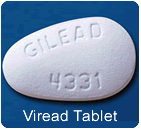By
Liz Highleyman
 M.
Manns from Medizinische Hochschule in Hannover, Germany, and
an international team of colleagues evaluated the activity of
tenofovir in patients with suboptimal virological response (HBV
DNA remained > 400 copies/mL) to adefovir, with or without
prior use of lamivudine
(Epivir-HBV).
M.
Manns from Medizinische Hochschule in Hannover, Germany, and
an international team of colleagues evaluated the activity of
tenofovir in patients with suboptimal virological response (HBV
DNA remained > 400 copies/mL) to adefovir, with or without
prior use of lamivudine
(Epivir-HBV).
Tenofovir
has demonstrated potent activity in hepatitis B "e"
antigen (HBeAg) positive and negative, treatment-nave and lamivudine-experienced
chronic hepatitis B patients, the researchers noted as background.
But in vitro studies have shown varying degrees of sensitivity
to tenofovir in virus strains with different patterns of adefovir-associated
resistance mutations.
This
retrospective pooled analysis included 160 HBeAg positive and
HBeAg negative patients with persistent viral replication after
at least 24 weeks (mean 53 weeks) of adefovir therapy; 23% also
had prior lamivudine experience. Participants were treated with
tenofovir for up to 96 weeks in 3 randomized Gilead studies:
GS-US-174-0102 (35 patients), GS-US-174-0103 (72 patients),
and GS-US-174-0106 (53 patients).
A
majority of participants (approximately 75%), were men, roughly
half were white, and about one-third were Asian, though proportions
differed considerably from study to study. Overall, 65% were
HBeAg positive; about 43% had HBV genotype D, 36% had genotype
C, 19% had genotype A, and 9% had genotype B.
Studies
102 (HBeAg negative) and 103 (HBeAg positive) compared tenofovir
vs adefovir for 48 weeks, followed by open-label tenofovir through
96 weeks. Study 106 compared tenofovir monotherapy vs tenofovir
plus emtricitabine
(Emtriva) in adefovir-resistant patients. Participants with
HBV DNA > 400 copies/mL after week 24 could choose
to add emtricitabine; they were considered to have treatment
failure if the combination still did not suppress viral replication.
Results
 |
Overall,
in an intent-to-treat analysis, 77% of patients in the 3
trials had HBV DNA < 400 copies/mL after 24 weeks of
tenofovir monotherapy: |
 |
75%
of 141 participants with no baseline resistance mutations; |
 |
86%
of 7 patients with lamivudine resistance; |
 |
83%
of 12 patients with adefovir resistance. |
|
 |
59%
of participants had normalized alanine aminotransferase
(ALT), and indicator of liver inflammation, at week 24. |
 |
These
responses were maintained through 96 weeks of treatment. |
 |
Among
the 104 HBeAg positive patients, 10% experienced HBeAg loss
and 7% experienced HBeAg seroconversion during year 1, and
15% and 10%, respectively, did so during year 2. |
 |
Tenofovir
was generally well-tolerated. |
 |
No
participants discontinued therapy early due to an adverse
event. |
 |
2
patients experienced serious adverse events considered related
to tenofovir. |
 |
2
patients experienced a 0.5 mg/dL increase in creatinine
-- an indicator of kidney impairment -- but remained on
tenofovir following dose reduction. |
 |
No
participants experienced a decrease in creatinine clearance
to < 50 mL/min. |
 |
No
mutations associated with tenofovir resistance emerged through
96 weeks. |
"Complete viral suppression was observed following up to
96 weeks of tenofovir monotherapy in the majority of patients
with incomplete viral suppression on adefovir, including those
with prior lamivudine use," the investigators concluded.
"The safety and tolerability profile of tenofovir was good
and no resistance to tenofovir was observed."
Medizinische Hochschule Hannover, Hannover, Germany; University
of Toronto, Toronto, Ontario, Canada; Hopital Beaujon, Clichy,
France; Medizinische Klink mit Schwerpunkt, Humboldt-Universität,
Berlin, German; Gilead Sciences, Inc, Durham, NC.
5/4/10
Reference
M Manns, J Heathcote, P Marcellin, and others. Efficacy of tenofovir
DF treatment in patients with a suboptimal response to adefovir
dipivoxil. 45th Annual Meeting of the European Association for
the Study of the Liver (EASL 2010). Vienna, Austria. April 14-18,
2010. (Abstract
1017).